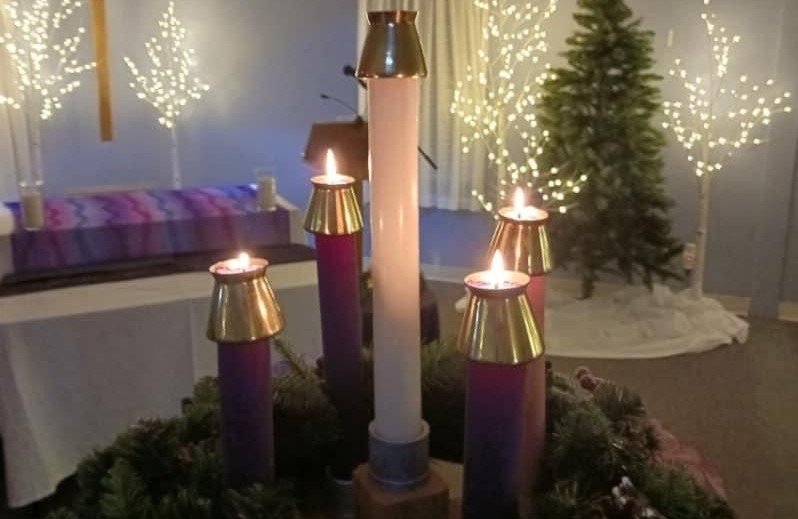Where all Families are Holy
Holy Family Inclusive Catholic Community is a faith community in central Illinois that exists within the Roman Catholic tradition and is inclusive of all people.
Holy Family Inclusive Catholic Community worships at 2939 Stanton Street, Springfield, Illinois. Come join us!

Holy Family Activities
October 2025
Saturday, October 11
- 4:30pm – 5:30pm
-
MassRecurs weekly
Saturday, October 18
- 4:30pm – 5:30pm
- Mass (Jerry preach)
Saturday, October 25
- 4:30pm – 5:30pm
-
MassRecurs weekly
November 2025
Saturday, November 1
- 4:30pm – 5:30pm
-
MassRecurs weekly
Saturday, November 8
- 4:30pm – 5:30pm
-
MassRecurs weekly
-
Homily for 25th Week of Ordinary Time 2025
by Bishop Mary Keldermans
I usually focus on the gospel for my homilies but today I am going to focus on the first reading from the prophet Amos. Who was Amos?
Amos was a shepherd and a farmer who lived near the city of Jerusalem. He would go to towns and villages to sell his goods and became aware of how some merchants were cheating the townsfolk. They would under- weigh goods and charge more; they would fill bags of wheat with little wheat and a lot of chaff. This enraged Amos who began to speak out about the corruption and thievery he saw. He spoke out about how the rich were getting rich off the backs of the poor. He saw and spoke out about how the cheating merchants justified their dishonesty using God and their adherence to the laws of Judaism. They claimed God rewarded them with wealth because they observed the laws of religion and they could afford big sacrifices at the temple. The poor? Well, they didn’t have the money to participate in the big sacrifices that one was expected to offer at the temple and so, God wasn’t pleased with them. It was their fault they were poor.
Thank heaven that doesn’t happen anymore!
We know Amos wrote this book 27 centuries ago. 27 centuries. In all that time, nothing seems to have changed. We could rightly throw our hands up in the air and say what’s the use? People are still lying and cheating their way to the top and are doing it on the backs of the working poor.
But – think with me. Are there really that many more people who cheat and lie their way to the top? I don’t think so. The thing that has changed is that we hear about it now. Amos didn’t have Facebook or Twitter or a blog or even an IPhone to record the corruption he was witnessing. However, we do. We hear and read about corruption and cheating almost as it is happening. We hear about the bad news, but the good news, not so much.
Good news doesn’t sell but bad news does. If we aren’t careful we could all too easily slip into despair, or paint people with a broad brush and think everyone is corrupt. But that isn’t true is it? Our experience tells us that most people are good people, with faults to be sure, but overall, good people.
Amos went on to have three dreams about how mad God was at the corrupt merchants and religious leaders for taking advantage of the poor. He got to the point where he started to lecture the elite class about their wrongdoing! Amos filled up nine chapters about his work, go ahead and read it. Spoiler alert, the elite, the merchants and religious leaders were not happy in the least with Amos!
Like Amos, we are speaking out about a problem in our day and age and drawing attention to the plight of immigrants among us. We’ve heard people say illegal immigrants only want to come to America to take our jobs and sponge off the government. Having helped immigrant families, we know that statement is false! Like Amos, we speak to the people who make those kinds of statements to set the record straight. These immigrants are hard workers! Immigrants are culturally wired to work to support their families, as are most cultures in the world. Immigrants come here because their family farms have dried up and factory work is available only to the politically connected. They love their homelands, they don’t want to leave but they can no longer make a living.
At Holy Family, we have given them monetary help as a leg up, but they work hard at becoming self-sustaining. The immigrants don’t want to be dependent on anyone, they have pride, dignity and want to take care of their own families.
We help where we are able; using the gifts God has given us to help those who need help. Our helping our families doesn’t stop with finances. It’s about relational resources, too, of offering friendship and empathy, kindness, understanding, humor and love. We respect their dignity as people of God, people who are made in the image and likeness of God.
If those resources I just named were money, then Holy Family would have trillions of dollars in the bank. Y’all are the most generous, most loving, most caring group of people I have had the privilege to know. My heart is so full when I see how many of you preach the gospel, very seldom using words.
I have asked Mary Bretcher, the chairperson of our Be Like Emma team to talk to you about the funds we have collected for Fernando and Sonia, and for Gaspar and Romillia, the two families whom ICE raided last May. I’ve asked Steve to give you a financial update on Holy Family’s funds and to ask an important question about earmarking money for our food pantry.